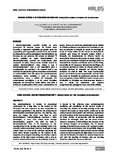Ensino médio e interdisciplinaridade: reflexões sobre o ensino de Sociologia

Visualizar/
Data
2012-05-31Autor
Lima, José Gllauco Smith Avelino de
Costa, Joicy Suely Galvão da
Pernambuco, Marta Maria Castanho Almeida
Metadados
Mostrar registro completoResumo
The Interdisciplinarity is debate in educational environment for a long time. In the context of this discussion, the need expressed by most responsible for curriculum organization is the need for the elaboration of interdisciplinary educational practices. The speeches, they seem, are always the same: "you have to work interdisciplinary"; "Interdisciplinarity constructs a fuller knowledge"; or even, "Our school works through interdisciplinary projects". But, after all, what is interdisciplinarity? What is its importance to the reconfiguration of the learning and teaching? What is its relevance within educational practices developed in high school? These are some of the questions motivating this work, which focuses especially on the analysis of the integration of sociological knowledge and of other subjects members of the high school curriculum, with a view to tecitura critical considerations on the problems at hand. It
is located in the reflection study methodologically qualitative and quantitative of the pre-test results of searching "the situation of teaching sociology at the high school of Rio Grande do Norte-Brazil", carried out by the research group Culture politics and education, Department of social sciences of the Federal University of Rio Grande do Norte (UFRN), in partnership with the Sociedade Brasileira de Sociologia (SBS) and the Social Science Research Laboratory (LAPIS-UFRN)on the occasion of the XIV National Congress of sociologists, the VII national meeting of Social Sciences courses and I national seminar of education in social sciences, held in April 2008. Brings as a general reorganization of both curricular teacher training courses on how to organize the high school, so as to break with the distribution of subjects by isolated departments and with the teaching of teachers who are teaching behaviors without the necessary reflection.



